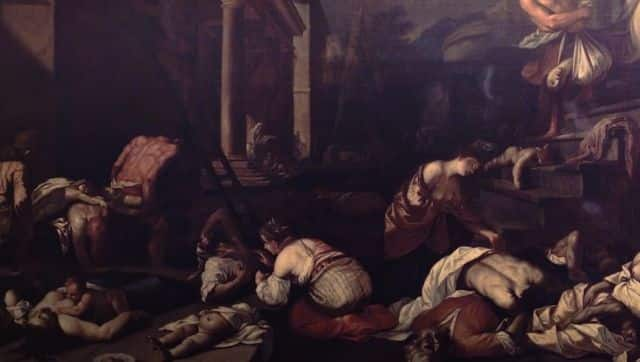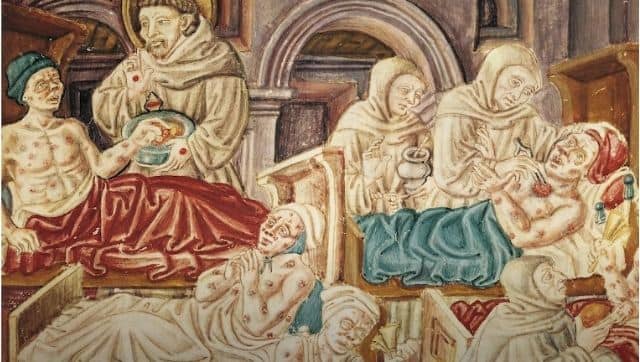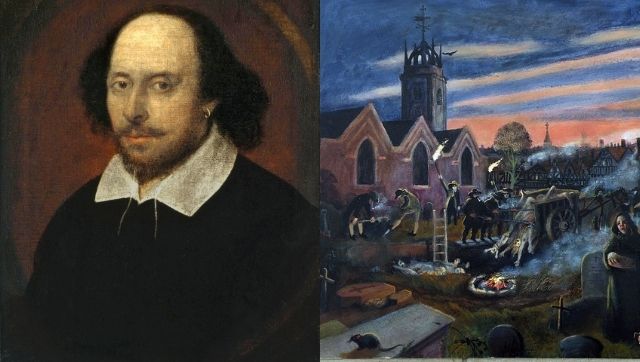For the students that make it past the mental block around William Shakespeare’s language, a delightful indulgence are the colourfully crafted, tastefully offensive insults with which his writing abounds. There’s the attack on manhood as Curtis says “Away, you three-inch fool!” in Taming of the Shrew; the popular yo mama joke as Aaron informs “Villain, I have done thy mother” in Titus Andronicus; Timon’s almost childish “I’ll beat thee, but I should infect my hands” in Timon of Athens; and among many, many others, the zinger about stupidity as Jaques laments in As You Like It: “… his brain, / Which is as dry as the remainder biscuit / After a voyage …”. In the cacophony of Shakespearean insults, a word that appears often is ‘plague’. His characters variously wish a plague upon each other, or use the word as a synonym for the person they’re insulting. “‘Twas pretty, though plague, / To see him every hour” recalls Helena in All’s Well That Ends Well. “A plague upon that villain Somerset” says the exasperated York in Henry VI, Part I. And perhaps most famously, “A plague o’ both your houses!” exclaims Mercutio over and over as he lays dying in Romeo and Juliet. Using the word plague seems a potent insult for Shakespeare, considering the bubonic plague had been a constant companion through his life. The playwright was born in the small English town of Stratford-upon-Avon in 1564, where his birth has been recorded in the baptismal register of the town’s Holy Trinity Church. Less than three months later, the register records a death with the Latin note “Hic incipit pestis” which translates to “here begins the plague.” As the plague spread, deaths multiplied, and a quarter of the town’s population succumbed to it. One of the Shakespeare’s’ neighbours lost four children. Some scholars believe that William also lost three of his sisters, Joan, Margaret, and Anne, none of whom made it past their childhood, to other waves of the plague.
A high mortality rate and a widespread awareness of the horrific power of the plague seem for him childhood realities.
[caption id=“attachment_9527501” align=“alignnone” width=“640”]  William Shakespeare portrait. Photo from Wikimedia Commons[/caption] As he reached London, a young man who had come to the city to make a living, the plague followed, visiting every few years. There were outbreaks in 1592-3, 1603, 1606, and 1608, among others. People suffered painful symptoms like swelling, delirium, vomiting, and internal bleeding. They quarantined with red crosses on their doors as authorities banned mass gatherings. Victims died within a week and were often buried in communal graves. Medical practitioners were largely unsuccessful in their efforts to contain the disease and many pointed either to pollution or religion, finally concluding that the best direction was staying indoors. [caption id=“attachment_9527481” align=“alignnone” width=“640”]  Plague. Photo credit: YouTube screenshot[/caption] As Shakespeare’s contemporary Thomas Dekker writes of the helplessness, death, and horrors in his pamphlet The Wonderfull yeare. 1603. Wherein is shewed the picture of London, ly-ing sicke of the Plague [The wonderful year 1603, wherein is showed the picture of London, lying sick of the plague]: “Sorrow & Truth, sit you on each side of me, whilst I am deliuered of this deadly burden: prompt me that I may vtter ruthfull and passionate condolement: arme my trembling hand, that it may boldly rip vp and Anatomize the vlcerous body of this Anthropophagized plague: lend me Art (without any counterfeit shadowing) to paint and delineate to the life the whole story of this mortall and pestiferous battaile, & you the ghosts of those more (by many) then 40000. that with the virulent poison of infection haue bene driuen out of your earthly dwellings: you desolate hand-wringing widowes, that beate your bosomes ouer your departing husbands: you wofully distracted mothers that with disheueld haire falne into swounds, whilst you lye kissing the insensible cold lips of your breathlesse Infants: you out-cast and downe-troden Orphanes, that shall many a yeare hence remember more freshly to mourne, when your mourning garments shall looke olde and be for gotten.” [Sorrow and Truth, sit you on each side of me, whilst I am delivered of this deadly burden. Prompt me that I may utter truthful and passionate condolence. Arm my trembling hand, that it may boldly rip up and anatomise the ulcerous body of this Anthropophagi (the nomadic Scythians that were often cannibals) plague. Lend me art, without any counterfeit shadowing, to paint and delineate to life the whole story of this mortal and pestiferous battle; and you the ghosts of those more, by many, than 40,000, that with the virulent poison of infection have been driven out of your earthly dwellings. You desolate hand-wringing widows that beat your bosoms over your departing husbands. You woefully distracted mothers that with dishevelled hair fall to fainting, whilst you lie kissing the insensible cold lips of your breathless infants. You outcast and downtrodden orphans, that shall many years hence remember again to mourn, when your mourning garments shall look old and be forgotten.] [caption id=“attachment_9527461” align=“alignnone” width=“640”]  Black Death. YouTube screenshot[/caption] As a scared and panicky people turned to religion for guidance, the plague always afforded a ready reason to shut down playhouses, something religious preachers wanted throughout the early modern period, based on moral objections. As one Reverend Wilcocks preached: “the cause of plagues is sin, if you look to it well; and the causes of sin are plays: therefore the cause of plagues are plays.” With the theatres shutting down every few years, actor and playwright Shakespeare, supported by wealthy patrons, seems to have made productive use of his time in quarantine. During the 1592-3 outbreak he’s believed to have written two narrative poems: Venus and Adonis, where he writes “That the star-gazers, having writ on death, / May say, the plague is banish’d by thy breath”; and The Rape of Lucrece where he asks “Why should the private pleasure of some one / Become the public plague of many moe?” During the 1603 outbreak, he may have been writing Measure for Measure. And in the 1606 outbreak, it is quite plausible that he was writing King Lear, a play which employs the word plague with a decided harshness. “… thou art a boil, / A plague-sore, an embossed carbuncle, / In my corrupted blood,” says Lear to his daughter Regan. “‘Tis the times’ plague, when madmen lead the blind” laments Gloucester. “The gods are just, and of our pleasant vices / Make instruments to plague us:” philosophises Edgar. And “A plague upon you, murderers, traitors all!” condemns Lear.
While the word plague is a constant presence in Shakespeare’s language, and life, it’s never a major theme in his writing. None of his plays directly details the plague, nor do any of his characters die of it. As early modern scholar Emma Smith notes, “Documentary realism was not Shakespeare’s style.” The closest Shakespeare comes to affording the plague a direct place is in Act Five of Romeo and Juliet. Juliet has consumed the potion that makes her appear dead to escape a marriage with Paris, she’s been buried, and Friar Laurence has sent a letter to Romeo to make him aware of the plan. But the letter never reaches him. Instead, he sits with Juliet at her grave and drinks poison, following which Juliet awakens and stabs herself. But why didn’t the letter reach him? The messenger, Friar John, explains: “Going to find a bare-foot brother out One of our order, to associate me, Here in this city visiting the sick, And finding him, the searchers of the town, Suspecting that we both were in a house ere the infectious pestilence did reign, Seal’d up the doors, and would not let us forth; So that my speed to Mantua there was stay’d.” [caption id=“attachment_9527521” align=“alignnone” width=“640”]  Romeo and Juliet. Photo credit: YouTube screenshot[/caption] It’s a simple detail. He couldn’t travel to Romeo because others suspected he had come in contact with that “infectious pestilence” and was forced into quarantine. The mention of the plague itself is fleeting, but its effects are disastrous as the lack of communication leads to both suicides. Like a deadly monster lurking always in the background, the plague causes havoc and destroys the lives even of those who are healthy and otherwise untouched by it.
While the two star-cross’d lovers met in the unfortunate circumstance where hate governed most hearts, their tragic fate is infected inextricably by the plague.
Although we know that the plague is always around Shakespeare, the play offers possible insight into his understanding of it. As a playwright, instead of documenting and exploring the horrors around him, the plague is something he’s decidedly looking away from. Given how frequently waves erupted, it might be that it was a reality too common and frequent to be shocking or inspire hysteria in him. Or, simply, something he didn’t consider good entertainment. While his mental attitude is of course indiscernible, one can see that Shakespeare is not bogged down by the mourning, and the depressing statistics of death around him.
His defiant response instead is to place each character’s humanity and individuality at the centre of his works and meditate on the human condition, while steadfastly ignoring the disease that regularly swelled and affected all life around him.
In doing so he is offering his audiences not just respite from the dire reality they lived in, but also the inventive words of insult that allowed them to carelessly toss around, and even joke about, this most serious of killers. Featured image: Shakespeare portrait from Wikimedia Commons. Plague painting from Wikimedia Commons/Rita Greer


)
)
)
)
)
)
)
)
)



